There is revolution in e-commerce when it comes to business operations online through conversation commerce powered by conversational AI. This translates into conversations between businesses and their clients via chat boxes, messaging platforms, and other talk-based interfaces.
Moreover, it improves the experience of shopping by making it interesting and customized for everybody while facilitating and speeding up purchases as well. Companies may improve their sales volumes, as well as consumer satisfaction by adapting conversational commerce solutions within them.
Discover how Conversational Commerce can elevate your business – Download our AI solutions!
The reason for eCommerce chatbots’ effortless connectivity and reach is these two features.
Natural Language Processing (NLP) – behavioural technology that enables AI to interact with humans through natural language.
Machine Learning (ML) – a subfield of AI that empowers a machine to imitate intelligent human behaviour.
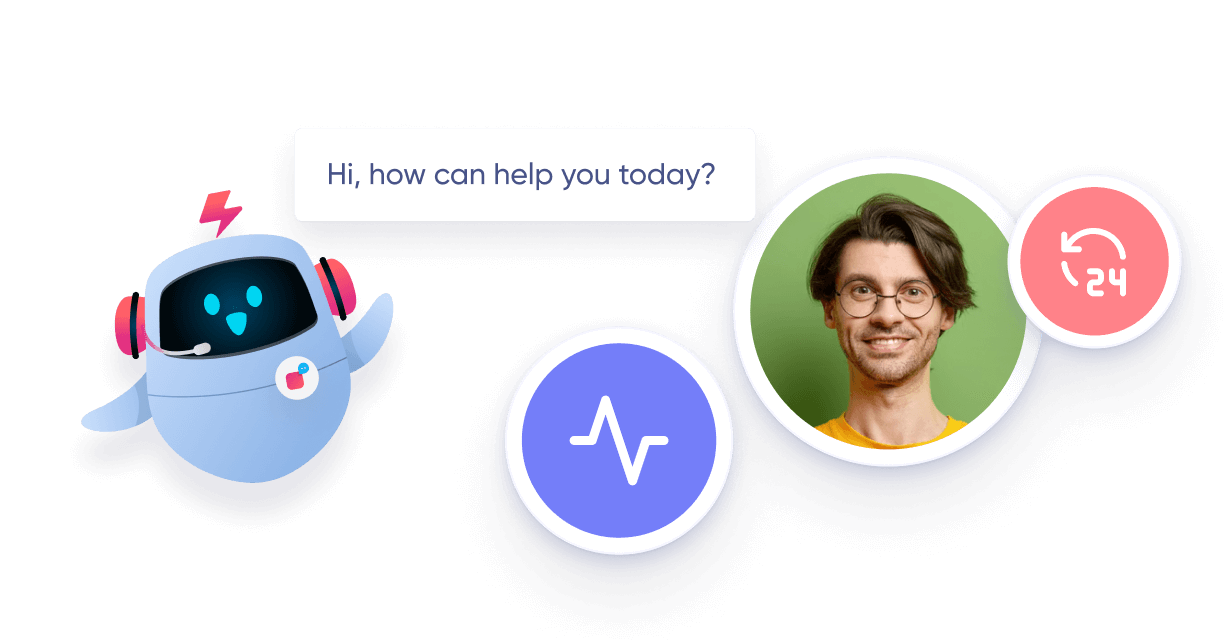
As a vital part of conversational commerce, omnichannel chatbots provide an immense growth opportunity for conversational AI in ecommerce. The use of such chatbots goes a long way in ensuring that an individual receives a personalized shopping experience whenever s/he visits them from any platform.
In addition, the conversational commerce platform uses data analysis to anticipate the wants of their customers and even to foresee how they will behave.
Businesses become better placed in their operations because this deep understanding allows them to give tailor made advice and solutions that make people enjoy the shopping. Conversational shopping has entered the ecommerce domain, thereby changing how customers are engaging with brands.
Suggested Reading: How to Reduce Cart Abandonment
Here are the benefits of conversational AI in eCommerce below.
Conversational AI adds more clients by giving them intelligent but personalized dialogues.
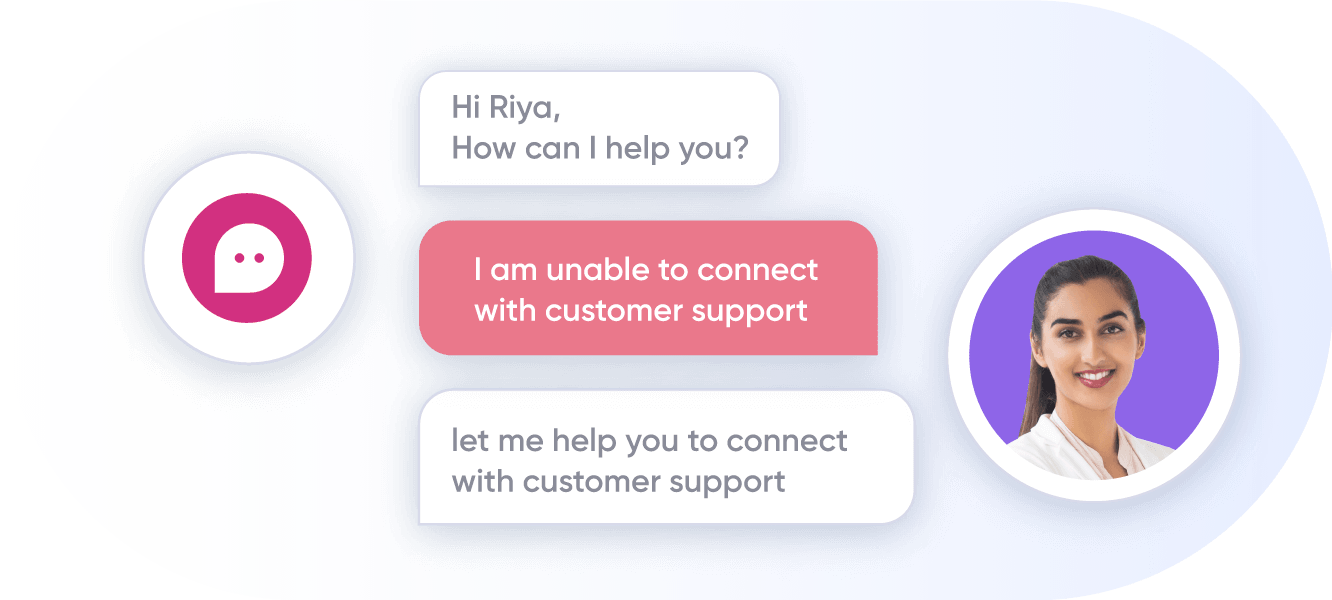
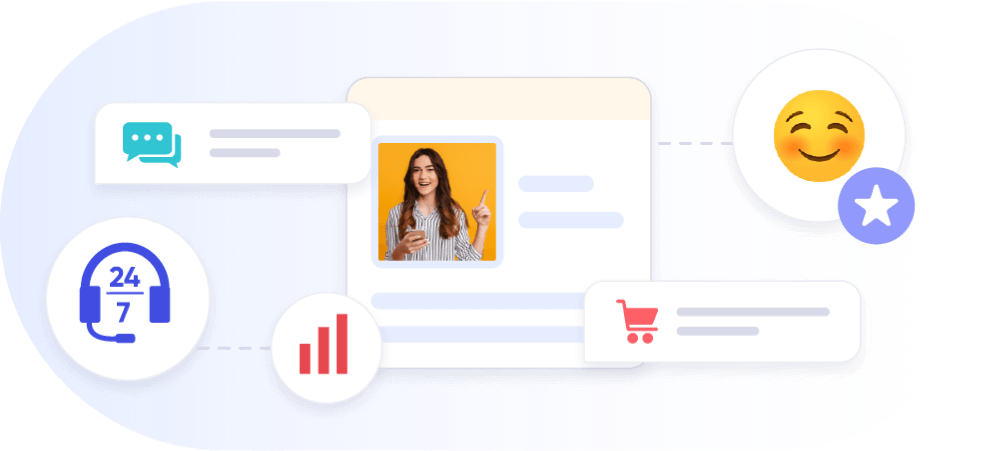
Ensuring 24/7 customer service by chatbot AI trained operators. This is crucial because they would prefer quick responses through chats than other forms of communication.
Most of the customers buy their products using these chatbots, as they help them personalize experiences for the users with regard to their preferences and history.
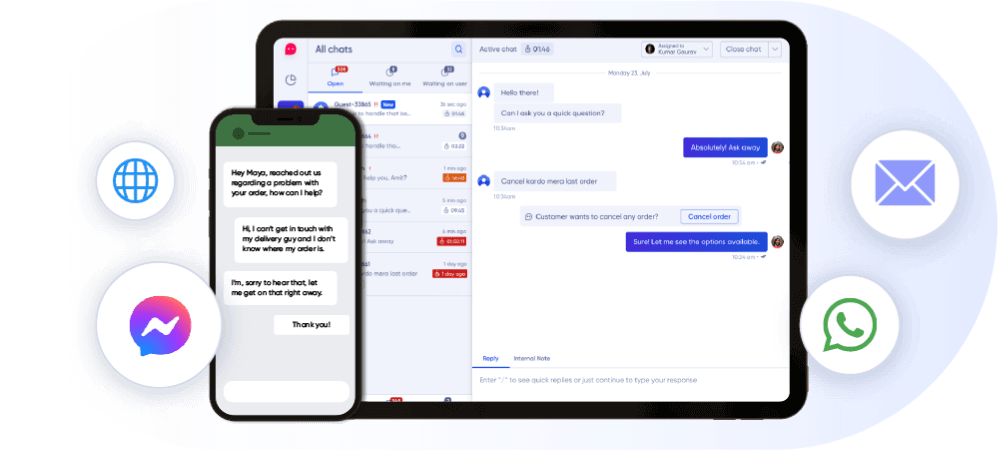

Companies incorporating chatbots in customer service departments report a 30% reduction in costs per query, exemplifying significant operational savings
The preference for most of the customers towards using messaging apps in place of phone calls clearly shows a trend moving towards the digitalization of conversation for customers’ service.

If you want to run a successful eCommerce business at a scale, you need chatbots to maintain and talk to your customer base. It is not feasible today to hire multiple human agents who can provide an instant solution to the large volume of queries your business might get. Therefore, adapting to trends and welcoming an eCommerce chatbot to your business can pay off exponentially, and enrich your business with the following benefits.
The benefits of using the power of AI in chatbots are.
Chatbots are there to serve your customers at any time. They can act as your agent’s right hand and be available even when your agent decides to take a short break, leaving no customers unattended at any cost!

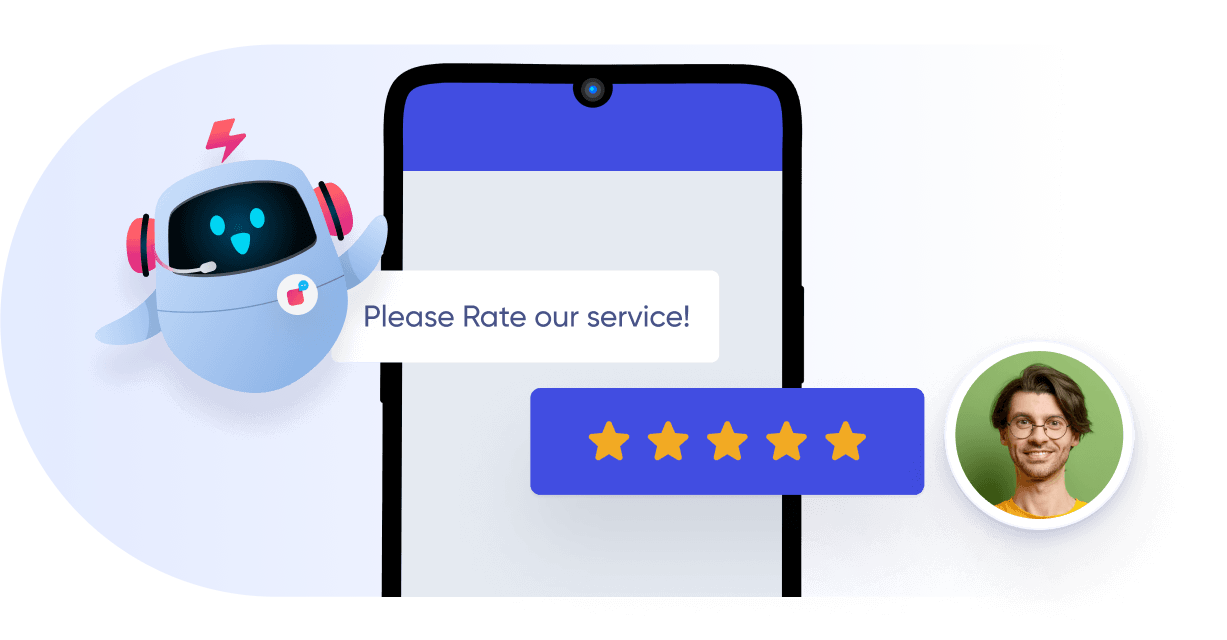
Chatbots can quickly and efficiently respond to your customer. When asked to list the benefits of speaking with a chatbot, 68% of respondents said that getting a speedy response was the best part.
Most businesses believe they generate better leads with chatbots and can drive higher sales by upselling, marketing and leveraging cart recovery alerts. As a result, Juniper Research projects that by this year (2023), chatbots will be used in $112 billion worth of eCommerce transactions..


Simple user questions may be handled by chatbots, freeing up human customer service personnel to tackle more complicated concerns. Additionally, chatbots can manage an infinite number of consumer interactions simultaneously. By the end of 2023, businesses will save approximately 2.5 billion customer service hours and $11 billion.
Conversational ecommerce is a new concept that has emerged and has completely changed the landscape of online retail shopping. Conversational AI is quickly becoming popular in eCommerce, enabling business adaptation into an innovative, conversational approach. Personalized customer experience resulting from the adoption of conversational commerce solutions such as chatbots has improved customers’ satisfaction levels and loyalty towards a firm.
Such conversational ecommerce chatbots built on AI enable one to understand better customer conducts and preferences with sophisticated analytics. The shift has responded to the increased demand for consumer-specific experience while signaling the coming age of conversational commerce.
An eCommerce business chatbot is your go-to innovative tool for meeting customers’ ever-evolving needs.
Let’s find out how!
When you leave customers on your eCommerce website unattended and have them navigate your products on their own; they may leave the site without a clear picture of your offerings. But with an efficient AI chatbot in place, you can see an immediate surge in positive customer experiences, conversions, and sales.


Personalization entails providing a one-of-a-kind shopping experience to each customer in real-time. The best eCommerce chatbots let you speak to your user’s subconscious mind. Personalising your customer’s search with more appropriate options can help you sell more and guarantee your user an integrated shopping experience..
An eCommerce business receives thousands of support requests daily. Without automation, agents are left with many tasks and frustrated customers. High wait times to get in touch with the support team + having to repeat their queries to different representatives are blaring red flags to customers! An eCommerce chatbot messenger can swoop in, respond to the most frequent queries, and let your agents handle the complex ones! .

Let’s hop in to understand this innovative process!
To build a delicious recipe of seamless and effective customer support, you need two ingredients:
1. Natural language processing (NLP) and
2. Machine learning (ML) techniques.
An eCommerce chatbot employs natural language processing (NLP) algorithms to decipher the client’s message and determine its intent when the consumer starts a discussion. With this knowledge, the chatbot may access a list of replies or actions pertinent to the customer’s request.
The chatbot processes and examines the customer’s communication using machine learning. It may gain knowledge from prior interactions and apply it to develop better replies over time using sophisticated ML algorithms.

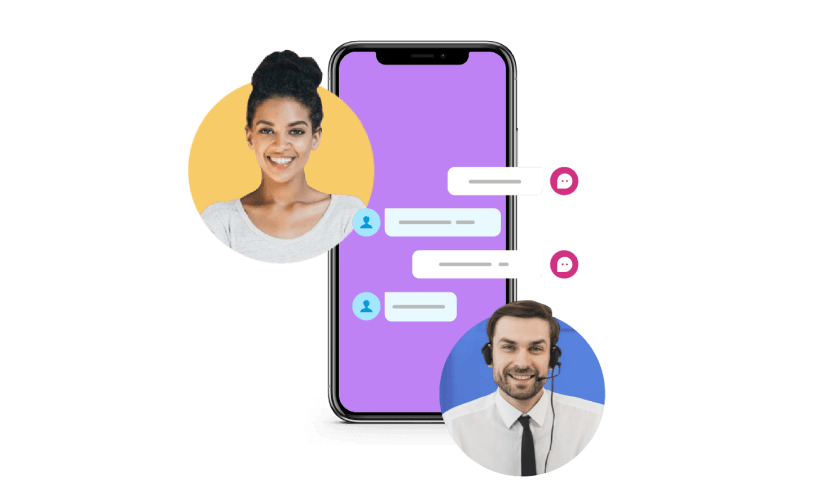
Then to identify what to say next in a conversation, a chatbot employs a set of predetermined rules and a decision-making tree, this process is known as dialogue management. Chatbots can operate in various ways, including giving an answer, addressing a query, or even carrying out a transaction, depending on the message analysis and decision made by the dialogue management.
Additionally, chatbots may be coupled with other platforms, such as a business’s CRM or e-commerce platform, to access more data and carry out activities like updating customer profiles, confirming the status of an order, or processing payments. In general, e-commerce chatbots are intended to make it quick, simple, and convenient for customers to receive customer support.
Conversational commerce boosted by Conversational AI in ecommerce is swiftly redefining the retail industry. Here are some key use cases:
A conversational ecommerce chatbot simplifies ordering processes by enabling customers to make and track orders through commonly used messaging applications. It is a modern convenience that contributes to the general shopping atmosphere.
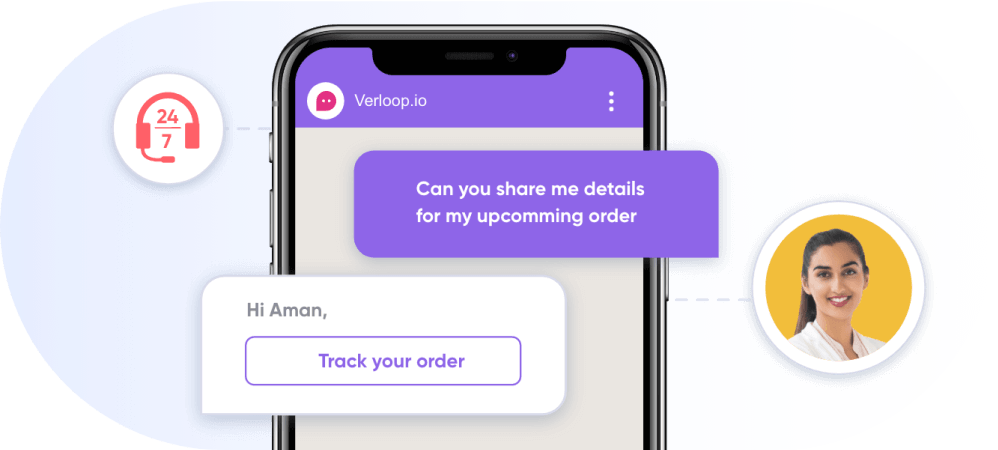
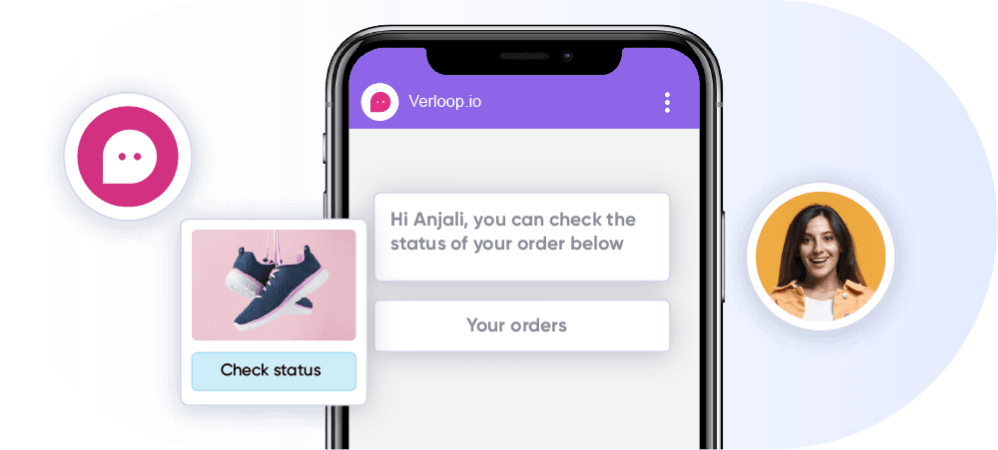
Conversational selling eCommerce automation tools utilize customer data to give them personalized recommendations corresponding to their tastes and previous behavior. Customer engagement and sales are enhanced enormously with this adapted method.
Chatbots that act so quickly as soon as a customer’s question is raised thus increase high-level customer care. Customers notice that Conversational Commerce quick answers are more efficient than traditional ones.

Recent statistics underscore the growth of this domain: AI and chatbots has been widely accepted among online consumers and this behavioral shift is estimated at 74% users. Its worldwide market size is forecasted to exceed USD 15.5 billion by 2028, proving that it is generally accepted as a conversational e-commerce platform.
Together, these trends and stats show that conversational commerce as a whole, and particularly conversational ecommerce chatbots, are not just a passing fad.
Moreover, it represents an emerging future of conversational commerce, completely reshaping how enterprises engage and cater to customers.
Now that we’ve known how useful eCommerce chatbots can be let’s dive into
some of the crucial tasks an eCommerce Chatbot can be a helping hand in!
eCommerce businesses likely have the largest product portfolios of any internet business.
When things are divided into multiple categories, users find manual browsing to be relatively ineffective. Chat-based eCommerce lets your customers focus their search by simply chatting with the bot. An eCommerce chatbot can make browsing your catalogue easier on all your social media platforms..


As mentioned earlier, you can communicate with your users’ subconscious minds with eCommerce chatbots.
Conversational Automation Analytics can measure how much time each user spends on each message, what call to action they respond to, what their attention span for particular forms of media is, and heat maps to track which parts of the certain cause “tension” to the sales process because bots break each part of the sales funnel into individual messages.
The best eCommerce chatbots can further personalise the user’s experience by recommending, “Hey, would you also like to look at these strong phone cases to go along with your purchase?” while presenting applicable options.
Your customers want to return a product? Replace it?
Are they asking you to process a return?
With an eCommerce chatbot, you can say goodbye to the day-to-day back, and forth you and your agents usually have with customers. Your smart AI chatbot is prepared to respond and automate such post-sales tasks, whether it’s one of these OR informing your users when they return to check on the status. .


Emphasizing your customers’ needs heavily can increase your profitability by 60%. And once again, a well-designed eCommerce chatbot template can assist you by automatically collecting client feedback after every customer engagement.
How did your service fare with your customers?
Did they enjoy the payment procedure?
Your eCommerce chatbot can gather priceless crucial insights by just interacting with them..
AI-based eCommerce chatbots makes it simple to provide clients with the information they need to know.
For instance, the bot will provide one-touch access to the FAQ area when a consumer chooses a specific product. Additionally, if clients need more information, the chatbot can quickly process the input and deliver the needed details. As a result, the eCommerce chatbot’s user interactions streamline the purchasing process, increasing user engagement and revenue.
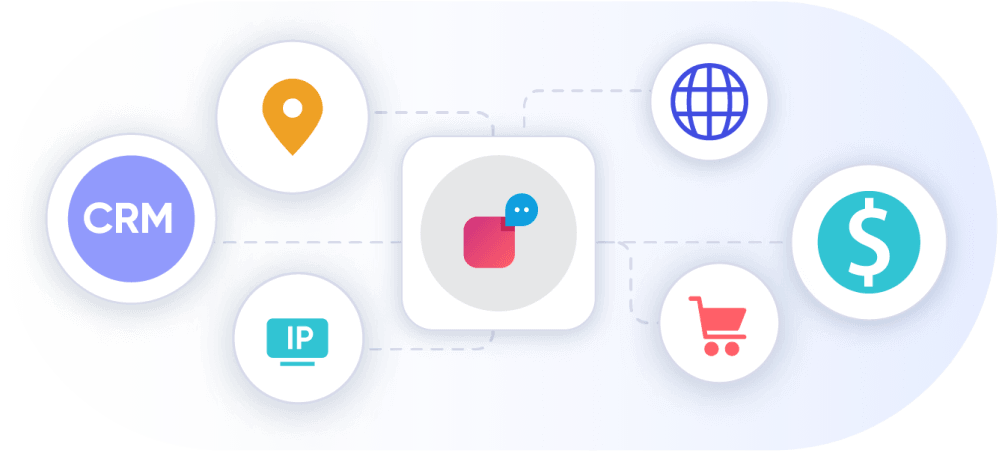
Assessing your conversational commerce efficiency is crucial, and Verloop.io offers robust solutions to optimize this aspect. Verloop.io specializes in Conversational AI in eCommerce, providing tools that enhance customer interaction and drive sales. Their platform offers a range of features including advanced conversational chatbots, which are instrumental in defining modern shopping experiences.
With our top solutions, you can also assess how conversational commerce is effective. We are a solution provider in Conversational AI for eCommerce, creating solutions that boost customer interaction resulting in increased sales.
Our platform provides many features including advanced conversational ecommerce chatbots, which are instrumental in defining modern shopping experiences.
The eCommerce chatbot from Verloop.io increased Nykaa’s engagement by 2.2 times.
For more than 500,000 clients on its app, Nykaa automated customer issues ranging from cancellations, returns, shipping questions, replacement worries, refunds, and payment hassles using eCommerce chatbot templates targeted towards various use cases.


Frontier Markets expanded its reach to more than 500,000 rural Indian households with a dedicated eCommerce chatbot that taught Hindi. The WhatsApp chatbot provided customers with meaningful information and assisted their workforce in managing their workload. Verloop.io’s WhatsApp Chatroom Report was an efficient tool to get to know their clients, and the User Insights tools by Verloop.io helped Frontier Markets structure the query management..
Kanmo Group is a compelling instance of the advantages of having a well-trained multilingual chatbot. 97% of users of Kanmo Group spoke and preferred to communicate with the company in Bahasa over English. Kanmo Group was able to divert 42% of all inbound inquiries from email, which is now the primary support channel. Going Indonesian first not only helped the business direct the customer inquiries to the bot but also allowed its live operators to increase their productivity by up to 42%!.


Water Projects achieved a 50/50 split between generated and qualified leads before deploying Verloop.io. Then, WaterProjects created their bot in Spanish, and customers received all responses to their queries in Spanish. This bot could also simplify the flow of conversations for customers and attract more prospective clients. However, according to its most recent data, Verloop.io has a 94% qualifying rate as Verloop.io’s bot brought in more customers! .
